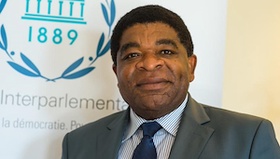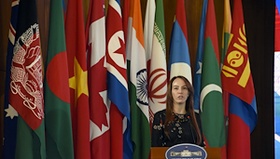The State Great Hural (Parliament) of Mongolia in
collaboration with the Inter-Parliamentary Union (IPU) have jointly organized
the Second Regional Seminar for the Asia-Pacific Region Parliaments on
Achieving the Sustainable Development Goals (SDGs). The seminar took place in
Ulaanbaatar on May 27-28, 2019.
At this seminar 19 members and non-members of the IPU as well as over 100 delegates from international organizations have participated on heightening understanding about how parliaments can institutionalize the SDGs, promote convergence between the 2030 Agenda and national action plans and build coherence around the SDGs at the policy level.
The aim of the seminar was to further define the opportunities and challenges facing parliaments in the Asia-Pacific region in exercising their role in SDGs implementation. It provided a platform to share experiences, facilitate mutual learning on meeting the SDGs, engage in comprehensive discussions and get acquainted with good practices in developing effective parliamentary strategies for SDGs implementation.
Below the agenda for the Second Regional Seminar for the Asia-Pacific Region Parliaments on Achieving the Sustainable Development Goals.
1. Opening session, May 27, 2019
2. Session I: Results obtained by Parliaments in the region by overseeing the implementation of the SDGs: The role of the self-assessment
- This session will be dedicated to parliamentary activities that have been put in place in order to advance the implementation of the SDGs at the national level. Parliamentary representatives will be invited to present their experiences regarding the introduction of parliamentary oversight mechanisms and cooperation with the executive. A particular matter that will be considered is to what extent the parliaments used the IPU self-assessment toolkit to start their own process of internal benchmarking and to assess their state of preparedness for engagement with the SDGs.
|
3. Session II: Education as a critical precondition to break the cycle of poverty - Ensuring quality education for all is not only central to the achievement of all SDGs but in particular the goal to end extreme poverty. The aim of the debate on this topic is to have an exchange of experiences in the fight against poverty in the States in the region through education. Socially and economically marginalized groups, such as women or stateless persons, are the ones who face more difficulties in having access to education. Members of parliament will have the opportunity to present their views on the most efficient ways to address this issue in order to ensure that no one is left behind. 4. Session III: Ensuring good health and well-being for all through the SDGs |
- Good health and well-being are key determinants of human development. This session will discuss SDG 3 on health. It will present the challenges and latest achievements in the region on maternal, child and adolescent health, HIV/AIDS and other diseases, as well as sexual and reproductive health. Participants will discuss how countries can advance their national health agenda and improve access to healthcare for women, girls and other marginalized and vulnerable populations, including by addressing social and financial barriers and by ensuring that healthcare facilities adequately respond to the needs of all. The session will also focus on the importance of having constructive debates on how education could play a central role in protecting the health and well-being of children and young people.
May 28, 2019
5. Session IV: What are the lessons to be learned and what preventive measure can be taken to fight against climate change?
|
- This session will allow participants to discuss climate change from an angle mainly focused on the importance of building a culture of prevention and promoting a transition to a low carbon, resource efficient and socially inclusive economy. Participants will have the opportunity to exchange on how parliaments and parliamentarians could promote “environmental literacy” and increase awareness on climate change and disaster risk reduction. The session will also foresee the presentation of the newly published IPU study on “The role of parliaments in advancing transition to green economy”. |
6. Session V: Ensuring national ownership and supporting monitoring of progress through the use of high-quality data
- This session will consider ways to engage citizens in the legislative and oversight work of parliaments. The SDGs will in fact not be achieved without significant public awareness and engagement. Participants will have the opportunity to discuss how to ensure access to high quality data in order to measure and monitor progress towards the SDGs and to identify innovative ways for citizens to provide bottom-up feedback to policymakers on the implementation of the SDGs. Particular attention will be paid to practical ways to enhance this interaction, including ways to effectively communicate on the SDGs and ensure that citizens assume an active role in the SDGs implementation process.
7. Roundtable Discussions
8. Adoption of the outcome document
9. Closing session

 Мон
Мон  English
English

